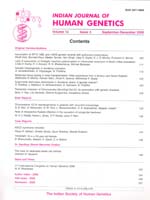
|
Indian Journal of Human Genetics
Medknow Publications on behalf of Indian Society of Human Genetics
ISSN: 0971-6866 EISSN: 1998-362x
Vol. 9, Num. 1, 2003, pp. 3-4
|
Indian Journal of Human Genetics, Vol. 9, No. 1, Jan-Jun, 2003, pp. 3-4
Editorial
Is prenatal diagnosis the solution to control some of the genetic
disorders in developing countries? YES
Dipika Mohanty
Editor, Indian Journal of Human Genetics
Code Number: hg03001
There are some 5000 inherited diseases which results from mutations involving
a single gene also known
as monogenic diseases.1 Examples include inborn errors of metabolism,
inherited hemoglobin disorders, cystic fibrosis and hemophilia etc. The global
prevalence at birth of all single gene disorders is about 10 per thousand. These
can not be cured and they require a continuous lifetime medical care which is
very expensive. This burden becomes very heavy in developing countries who have
limited resources for health care. The availability of first trimester prenatal
diagnosis have enabled us to avoid the birth of such fetuses. Between 1981 and
2000, eleven hundred twelve genes in which mutations reading to monogenic diseases
is discovered. This new genetic information and the advances in recombinant DNA
technology has lead to the development of reliable, easy and cost-effective tests.
These tests are being increasingly used not only in developed countries but also
in developing countries like India, Thailand etc. for detecting carriers, for
prenatal diagnosis, counseling and population screening. The aim of the prenatal
diagnosis is to provide the reassurance to the cupules at risk that may have
an unaffected child either by in-utero therapy or by selective termination of
pregnancy by early detection of such defects. The individuals concerned about
the risk of fetal defect should be counseled prior to conception and prenatal
diagnostic tests. Surprisingly, in our experience at IIH, Mumbai to share that
the acceptance of the need of termination of pregnancy in some of the diseases
like thalassemia and hemophilia is very high cutting across the religion barrier.
This is in contrast to some developed countries like Canada in relation to hemophilia
where the
acceptance of prenatal diagnosis is comparatively less since the total health
care expenses is borne by National Health Services of their countries.
Because genetic services requires a high capital investment
and good expertise in DNA technology there are fears that this will be impractical
proposition for our Health Care System. However, this is to reiterate that
in our country, development of centers with expertise in screening, DNA diagnosis,
education, counseling and management of these conditions, being increasingly
available both in public and private sectors. Hence it will hence be very cost-effective
to establish these facilities in the long run. The cost of one prenatal unit
diagnostic set up is about 20 lakh rupees (40,000 us dollor) which is equal
to the amount necessary for the care of fifteen Thalassemia Major children
(average 30kg) annually. The Government should encourage this process and take
the lead in control of certain diseases like inherited hemoglobin disorders
and Hemophilia, fragile X-syndrome, cystic fibrosis, Down's syndrome etc. Public
education programs should also be established with the help of the NGO's to
make people aware of the benefits. The help of print and electronic media will
also greatly improve the awareness.
In this issue the article on "Alternate strategies for
carrier detection and Antenatal diagnosis in Hemophilia in developing countries" an
evidence that the expertise in our country do exists although in small pockets.
However, with the support and encouragement from the Government
and the International organizations like WHO many more centers can be established
to cater to the needs of the people from different parts of India. It is heartening
to know that WHO recently has taken initiatives2 to start the thalassemia
control program in SEARO countries, since the burden of hemoglobinopathies
is of very great dimension. Now, is the time to implement it with the help
of some of the medical colleges where the expertise can be built in having
genetic units who can perform prenatal diagnosis efficiently and effectively
to control the above diseases mentioned. This act I am sure will go a long
way to help
the people of India.
REFERENCES
- Genomics and World Health: Report of advisory committee
on Health Research WHO; 2002.
- WHO South-East Asia Advisory Committee on Health Research
: Report to the Regional Director 2003.
Copyright 2003 - the Indian Society of Human Genetics
|
